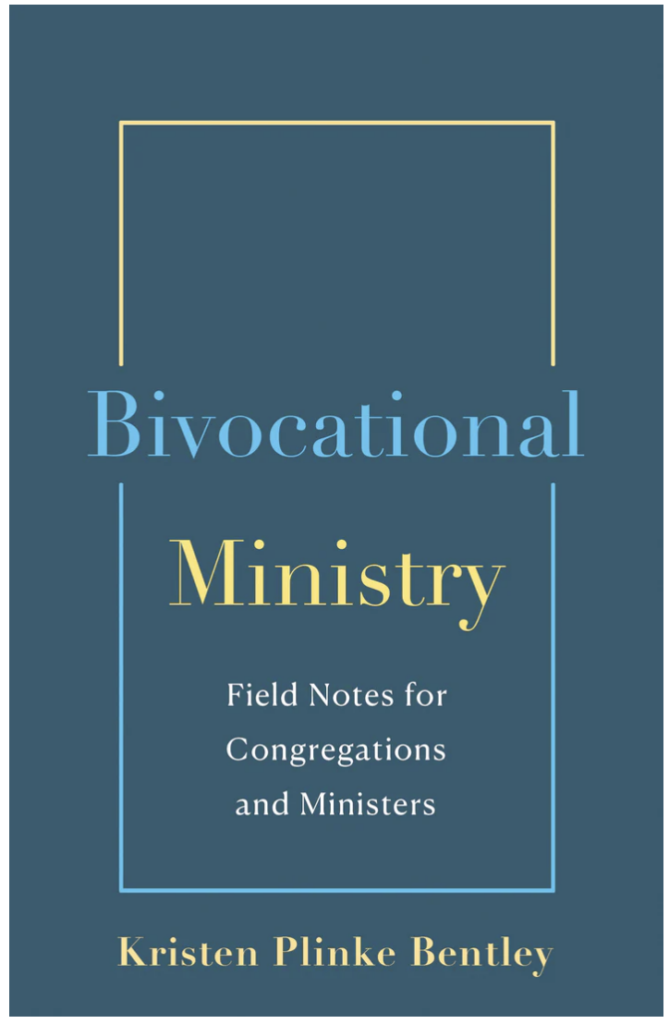We welcome Rev. Dr. Kris Bentley as our guest blogger this week to share what she learned writing her first book Bivocational Ministry: Field Notes for Congregations and Ministers. Kris teaches at Lexington Theological Seminary, directs research with bivocational ministers, and she regularly joins us at The Writing Table.
+++++++++++
I imagine that many of us know ministers who pastor a congregation near us while teaching or farming or working in a family business. Some of us ARE those ministers! When I began a research project at Lexington Theological Seminary in 2014, I had been pastoring for close to twenty years in central Kentucky, sometimes with paid employment outside the church as well. Interviewing and surveying bivocational ministers in a Lilly Endowment-funded study allowed me to hear directly from more ministers and to learn from important dimensions of their experience less familiar to me.
When I began writing the book, Bivocational Ministry: Field Notes for Congregations and Ministers (Chalice Press, 2024), I felt excited to showcases stories and insights of ministers who are “bivocational,” meaning, like me, they pastor a congregation while also being paid for work outside that congregation.
From the first days of the research project, people asked about what I was learning from the surveys and interviews I conducted. However, this book is not a research report. Instead, it is a resource designed to help congregations and ministers learn the experiences of those involved in bivocational ministry – from stories of success as well as challenges.
What is Bivocational Ministry?
Bivocational ministry has been a traditional model for a wide segment of the ministerial population. It is familiar in congregations located in a variety of contexts, such as those in rural areas and small towns, those serving predominantly African American, Hispanic, refugee, and immigrant communities. It is also a favored model for new church starts. And, yet, it has been overlooked. Many ministers and lay people I interviewed lament the limelight often shines on larger congregations and ministers who are called, “full-time,” overshadowing the faithful and invaluable ministry going on in many congregations with bivocational ministers.
Early in the research project, we focused attention on economic implications related to bivocational ministry. We found that ‘being bivocational’ contributes to financial stability for both congregations and ministers. Congregations with fewer financial resources can afford to call a minister who has additional income and benefits from other employers. Ministers can afford to say “yes” to their call.
Ministers also say that income from their other employment helps congregations resist the temptation to think church ministry is only the job of the minister. One minister said it this way, “they [congregation members] don’t look at you with the attitude of ‘well, we hired you to do that.’” This financial reality also centralizes the role lay leadership plays in congregations with bivocational ministers.
From Burnout to Joy
A favorite interview for me was one with a minister I call Pastor Bill in the book.* Pastor Bill was several years into his first experience of “being bivocational.” Previously he served full-time in larger congregations. He said the experience was helping him “heal from burnout” in congregational ministry.
Pastor Bill attributed the change to a real sense of “shared ministry” alongside lay leaders where he was serving. While it was this minister’s first time to serve as a bivocational minister, the congregation had decades of experience with the model. The lay people had well-developed practices of taking responsibility for the congregation’s ministry which did not revolve around the minister. In this setting, Bill said he found more freedom to preach and teach and collaborate in ministry. He said he was rediscovering joy in his role as a pastor.
Since many bivocational ministers carry heavy workloads, they are vulnerable to becoming overloaded. Some carry unrealistic expectations of themselves, as do their congregations. Paying attention to, and being willing to adjust, the expectations each have of their ministry together is important for this model of ministry. Ways of approaching this are included in the book.
Writing a First Book
 Writing Bivocational Ministry was my first effort in writing a book. While I knew it was important to share what I had learned, I was not sure I could do it well. So, I worked to keep focused on my goals for the book instead of my uncertainties. I benefitted immensely from joining The Writing Table, too. I found direction and gained confidence from coaching sessions with Eileen Campbell-Reed and from being part of The Writing Table community. Hearing the experiences of other writers, some of whom had written several books, helped me meet my weekly goals and persevere when I hit road bumps. All those things encouraged me, helped me pace myself, and complete the writing project.
Writing Bivocational Ministry was my first effort in writing a book. While I knew it was important to share what I had learned, I was not sure I could do it well. So, I worked to keep focused on my goals for the book instead of my uncertainties. I benefitted immensely from joining The Writing Table, too. I found direction and gained confidence from coaching sessions with Eileen Campbell-Reed and from being part of The Writing Table community. Hearing the experiences of other writers, some of whom had written several books, helped me meet my weekly goals and persevere when I hit road bumps. All those things encouraged me, helped me pace myself, and complete the writing project.
Working on a book designed to share stories and insights to help congregations at the grass roots level was energizing for me. I hope the book honors the experience of the many congregations and ministers involved in the model of bivocational ministry while also helping those who may be transitioning to it for the first time.
*All the ministers in the study have pseudonyms to protect confidentiality.
+++++++++
Excitement at receiving Kris’s book in the mail recently. You can have that excitement also! Order your copy of Bivocational Ministry today.




